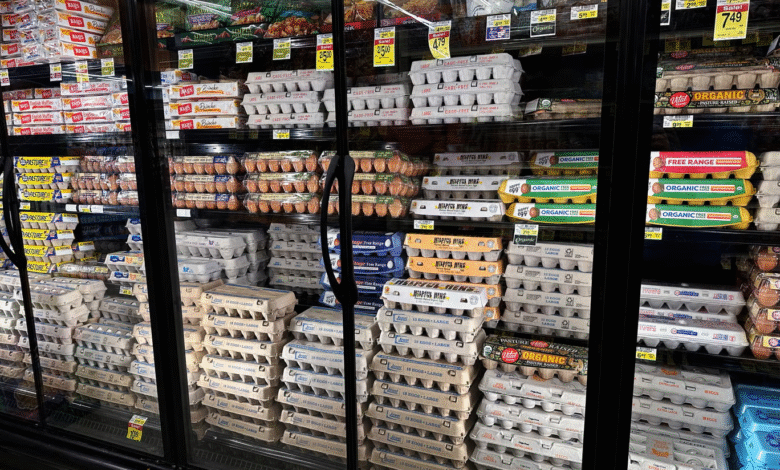Trump administration moves to loosen restrictions it once supported on a harmful pollutant
The Trump administration is loosening a federal rule that requires grocery stores, air-conditioning companies and others to reduce powerful greenhouse gases that contribute to global warming

Toward the end of his first term, President Donald Trump signed into law a bill aimed at limiting harmful greenhouse gas emissions from refrigerators and air conditioners. This bipartisan measure united environmentalists and major corporations—a rare occurrence—on the contentious issue of climate change and was widely praised across political divides.
Five years later, the Trump administration, in its second term, reversed course and sought to weaken federal regulations—based on a 2020 law—that require supermarkets, air conditioning companies, and other businesses to reduce emissions of potent greenhouse gases used in refrigeration equipment.
This shift in approach has challenged a broad bipartisan consensus on the need for a rapid phase-out of the domestic use of hydrofluorocarbons (HFCs), thousands of times more potent than carbon dioxide and considered a major greenhouse gas.
The Environmental Protection Agency’s (EPA) proposal illustrates the Trump administration’s second attempt to dismantle climate-friendly regulations, even at the risk of destabilizing the very business interests it claims to protect. This plan is part of a broader rollback of environmental reforms that EPA Administrator Lee Zeldin has called “an attack on the very core of climate change doctrine.”
Zeldin added in a statement that the proposed fluorocarbons (HFCs) would “make American refrigerants affordable, safe, and reliable again.”
However, environmentalists say the plan will worsen climate pollution and undermine years of industry efforts to adopt new refrigerants to replace HFCs.
Because HFCs are major contributors to heat waves and pollution, any delay in their phase-out “will have negative and disastrous consequences,” according to Keeve Gallagher, executive director of the Global Heat Reduction Initiative (GHI), an international initiative to reduce the heat trapped by the greenhouse effect responsible for global warming.
Industry groups support this phase-out.
A 2020 law, signed by Trump and known as the American Innovation and Manufacturing Act (AIMA), phased out hydrofluorocarbons (HFCs) as part of an international agreement on ozone pollution. This law accelerated the industry’s transition to alternative refrigerants made of less harmful and more widely available chemicals. The U.S. Chamber of Commerce and the American Chemistry Council, the chemical industry’s leading lobby, were among the many business groups that supported the law and the international agreement on pollutants, known as the Kigali Amendment, seeing it as a step forward for jobs and the environment. American companies like Chemors and Honeywell have developed and produced alternative refrigerants sold in the United States and around the world.
The 2020 law led to a 2023 law, currently being eased, which imposed stricter limits on HFCs starting next year. Zeldin said the Biden-era law didn’t give companies enough time to comply with the regulations and that the rapid shift to other refrigerants led to shortages and soaring prices. Some industry players dispute this view.
In September, the U.S. Environmental Protection Agency (EPA) announced a relaxation of standards for cold storage facilities and other refrigeration equipment, as well as a delay in the implementation of other provisions of the Hydrofluorocarbons (HFC) Act until 2032.
The EPA now says the law is penalizing businesses.
During a visit this summer to a refrigeration plant in key Georgia, accompanied by Vice President J.D. Vance, Zeldin said the administration was responding to complaints from supermarkets and refrigeration companies regarding the federal law.
“Within the Trump administration, we are responding to Alta Refrigeration’s call,” Zeldin said during a meeting with Alta Refrigeration on August 21 in Peachtree, Georgia, near Atlanta.
Zeldin added that the so-called Technology Transfer Act, finalized under President Joe Biden, restricts access to the refrigerants Americans need to cool their homes and businesses amid rising costs and shortages.
He added that Alta Refrigeration, along with supermarkets, the semiconductor industry, and many Americans, were unhappy with the law and pledged to “correct this mistake.”
The Food Industry Association, which represents supermarkets and suppliers, welcomed the EPA’s plan, saying the current law “imposed long and unrealistic compliance deadlines.” Leslie Saracen, the association’s president and CEO, said Zeldin’s proposal “achieves the desired environmental goals without imposing unnecessary and costly burdens on the food industry.”
Jorge Alvarez, co-founder of iGas USA, a Florida-based air conditioning company whose products contain HFCs, said Biden’s law was “presented” to him and threatened to create chaos. He added that this delay “gives the industry an opportunity to develop new refrigerants, and we will.”
The repeal of this law raises questions about Trump’s strategy.
This change of approach comes as industry players had already made adjustments to meet the targets set by the 2020 law.
“Changing the timeline now would disrupt planning and create uncertainty in the market,” said Samantha Slater, senior vice president of the Heating, Refrigerating and Air Conditioning Institute (HRIC), which represents more than 330 HVAC manufacturers and commercial refrigeration companies.
She specified that manufacturers had already adapted their production lines and standardized their models to the current timeline, noting that nearly 90% of residential and light commercial air conditioning systems use alternative refrigerants.
Ms. Slater added that this delay would benefit foreign competitors who have not invested in alternative refrigerants and could lead to “higher prices for American consumers.”
Chemores, the Delaware-based chemical giant and leader in alternative refrigerants, announced in a statement that it has “always supported a phased and orderly phase-out schedule for HFCs, as defined by the AIM Act.”
Joe Martinco, president of Chemores’ Thermal and Specialty Solutions division, said that delays in the transition “threaten to jeopardize and derail U.S. investments in manufacturing and innovation, while increasing uncertainty and supply chain inefficiencies, which will ultimately lead to higher prices for consumers.”
Despite the delay, the transition to low-global-warming-potential refrigerants is “well underway,” he said.
Martenko and other industry representatives confirmed that the temporary shortage of gas cylinders used by HVAC installers this summer—a shortage that Zeldin and others had cited as justification for delaying the EPA regulation—has been resolved.
David Doneger, chief strategist at the Natural Resources Defense Council, a non-profit environmental organization, asserted that current regulations ensure an effective and affordable phase-out of harmful hydrofluorocarbons (HFCs), while also providing regulatory uniformity for the industry and a means of maintaining global competitiveness.







